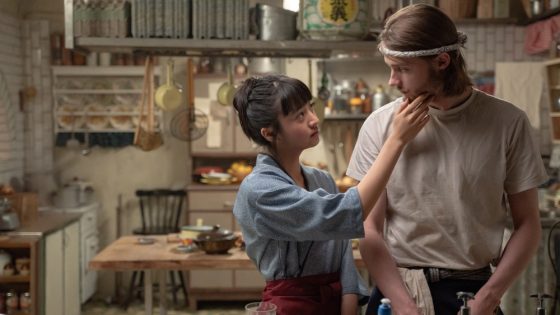The One Who Got Away is a romantic notion that’s been widely propagated by pop culture cinema. And for good reason, as heartfelt drama and compelling conflicts arise authentically from these confrontations with fate. Director-co-writer Baltasar Kormákur’s “Touch,” based on Ólafur Jóhann Ólafsson’s novel of the same name, expands on this swoon-worthy idea, elegantly crafting an achingly poignant story centered on an elderly man searching for his true love amidst a time of uncertainty. This gentle, unfussy romance contains a heart-clutching finale that’s as classically restrained as it is emotionally resounding.
Kristofer (Egill Ólafsson) lives a lonely life on the chilly seaside of Iceland since the death of his wife years prior. His days consist of singing in a men’s choir, chatting on the phone with his overbearing daughter Sonja (Harpa Elísa Þórsdóttir), owning a restaurant in his sleepy village and returning to the sad, silent sanctity of an empty home. Worried about slight memory problems he’s been experiencing, he visits his doctor only to learn he’s in the early stages of Alzheimer’s and must get his affairs in order before it’s too late. This becomes the catalyst for a journey of a lifetime.
The lone action item on Kristofer’s to-do list is finding out what happened to Miko (Kôki), his first true love, who abandoned him half a century ago when he (played in his younger years by Kormákur’s son, Pálmi) was living in London. Their initial chance encounter in her father Takahashi-san’s (Masahiro Motoki) Japanese restaurant, Nippon, led to a clandestine affair – the sudden loss of which caused a ripple effect in his marriage years later. However, just as our hero sets out on his quest for answers, the world begins to shut down due to the COVID-19 pandemic. A race against time ensues as he travels from Iceland to England and Japan.
With a litany of action-heavy films on Kormákur’s resume, everything from shoot-em-ups like “2 Guns” and “Contraband” to survivalist stories like “Everest,” “Adrift,” and “Beast,” he might seem like an odd choice to paint a deeply layered portrait of complex adult circumstances where there’s no big set pieces other than the reveals. Yet no matter the genre, he’s always elevated the material, capturing interpersonal relationships and character-driven dramatics with honesty, sensitivity and smarts. In “Touch,” the director’s singular vision is distilled into its purest form within the internal conflicts and connections, whether it’s a stranger at a bar reflecting upon his life well-lived or Hiroshima survivors haunted by their past trauma.
Kormákur and Ólafsson, who shares co-writing duties, make sure there’s never a dull, wasted moment. Though it lacks a stronger connection between the alternating timelines beyond narrative purpose, the non-linear storyline is never confusing. They instinctively allow tension to build steadily to its gripping 3rd act climax, which holds profundity and provides tear-shedding catharsis. The feature moves at a brisk clip, even within quiet moments of respite when our hero is deep in thought, remembering the past that’s made him the pained man we see in the present. Not only do Miko and Kristofer’s romance and potential reunion provide the narrative motor, further depth is attained exploring the blossoming friendship between Kristofer and Takahashi-san in a time not conducive to cultural empathy. Supporting characters, like Nippon’s charming waitress Hitomi (Meg Kubota) and opera-singing chef Arai-san (Tatsuya Tagawa), are also given a rich and economical internality.
Kormákur and company conjure feelings of affection and anguish with gorgeous visual dexterity. He and cinematographer Bergsteinn Björgúlfsson maximize the atmospheric pull utilizing subtle modulations within the cool blue-toned and warm sepia-washed color palettes. Effused lighting illuminates Miko and Kristofer’s unspoken, intertwined yearnings. Occasional bubble-like lens flares from natural light pouring into rooms gift the shots with a fresh, buoyant luminosity. Production designer Sunneva Ása Weisshappel creates intimate environments for these characters to play in, from the bakery-turned-commercial-kitchen to the walls of adult Kristofer’s desolate home.
Thematic overtones are sonically represented in Högni Egilsson’s tender, moving score that properly enhances motivations and augments actors’ work. As the violin strings are softly plucked, so are our heartstrings. Ólafsson and his young counterpart Kormákur pull off the tough job marrying their physicality and mannerisms. They share a commanding presence, playing a soft-spoken, vulnerable man forced into an uncontrollable transition. Kôki is a dynamic performer, depicting her character with grace, compassion and resilience. She instills in Miko a fighting spirit and autonomous sense of self. Her chemistry with Kormákur sparks the fire necessary to make the love story truly transcendent.
Though never overt in its intentions, nor its inspirations, the picture reverberates on a similar tonal key to Leo McCarey films like “Make Way For Tomorrow” and “An Affair To Remember.” Not only does it feature the tribulations of someone in their twilight years, there’s also the element of two lovers torn apart by destiny. Ultimately, however, this is a uniquely powerful, humane film about people rebounding from the rubble of devastating losses, choosing courage and love to overcome grief. And there’s nothing more touching than seeing that in action.
Source Agencies

